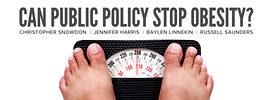Lead Essay
Christopher Snowdon reviews the efficacy and fairness of sin taxes aimed at preventing obesity. He finds that at low levels of taxation, consumers don’t change their behavior appreciably, and when they do abandon the taxed foods, it will often be in favor of other high-calorie choices. Very high levels of taxation may be needed to bring about significant public health benefits, but here the evidence is sparse, because few jurisdictions have tried taxation at these levels. Moreover, all such sin taxes are regressive; they hurt the poor disproportionately and become justly politically unpopular. Snowdon concludes that sin taxes aimed at obesity are an ineffective public policy tool, even on their proponents’ own terms.
Response Essays
Baylen Linnekin largely agrees with Christopher Snowdon on the question of food and soda taxes: They appear to be ineffective. But he takes the argument further in two ways. First, even while taxes show little promise in shrinking waistlines, several government programs, including farm subsidies and sugar protection policies, seem to aim in the opposite direction. If anything, they make Americans fatter. We should abolish these policies immediately. Second, he suggests that taxes on sugar are antithetical to longstanding American traditions, which in the Revolutionary era included outright revolt against the British Sugar Act.
Russell Saunders argues that obesity is a complex problem. While sin taxes might not work all alone, they can be a part of the solution. While one can become obese owing to calories from any source, some sources make obesity a great deal more likely. Sodas are just such a source. Taxing them has been shown to cause substitution among teenagers - not in favor of still more empty calories, but in favor of while milk and other more nutritionally beneficial choices.
Jennifer Harris argues that advertising has created a dangerous food environment, one that is too strong for most parents to overcome. So while we might all agree that parents should be responsible for their children’s health, this simply isn’t possible anymore: Corporate profits come first for corporations, and they are winning the battle over what goes into our kids’ bodies. The result is an epidemic of childhood obesity. Further, the evidence shows that obese children tend to grow into obese adults, with all the associated health problems. Local governments know the costs of obesity, and they have responded with exercise and healthy eating initiatives, including soda taxes, but also exercise programs and education about the benefits of healthy eating.
Related at Cato
Daniel J. Mitchell: British “Fat Tax” Would Mean More Intrusive Government, July 12, 2007.
Patrick Basham and John Luik: “Hard Truths about Soda Taxes,” July 6, 2010.

